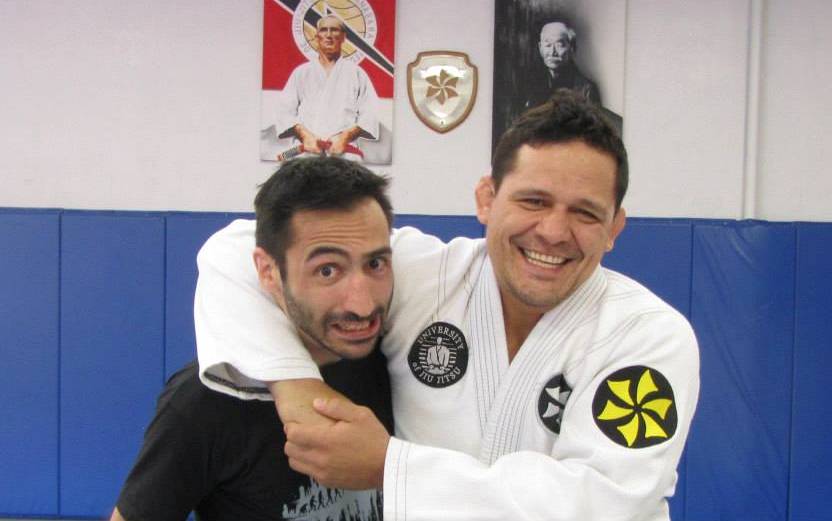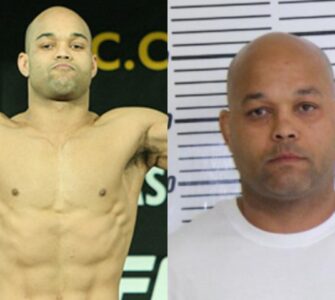Raphaël Lévy is one of the most interesting members of the worldwide BJJ community. He is a professional Magic: The Gathering player and world champion and is also the editor of the very popular Jits Magazine France. He was inducted to the Magic: The Gathering Pro Tour Hall of Fame. Another famous grappler who is a magic:the gathering fanatic is Josh Barnett.
In this interview with BJJ Eastern Europe, Raphael talks about the similarities between his two passions: Magic and Jiu-Jitsu, Jits Magazine France’s growth and about his numerous BJJ travels visiting different academies:
1. Hi Raphael, can you please introduce yourself to the BJJ Community of Eastern Europe?
Hi BJJ Eastern Europe, I’m Raphaël Lévy, I’m 32 years old. I’m a blue belt from Toulouse, France and train at Aranha Toulouse. The classes are given by Eric Satgé, black belt under Yan Cabral.
2. Please tell us about your Jiu-Jitsu story (how you started training).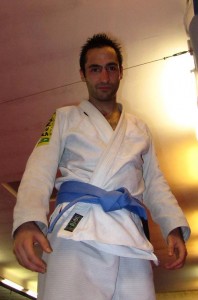
A few years ago, I was in Vancouver in Canada, wandering around in Stanley Park and thought:”I know how to do a lot of things, and have achieved a lot so far, but I’ve never been in a fight and have no idea how to defend myself in a “tough situation”. I need to learn how to do that. I was not particularly athletic, nor had a good physical condition. So without any guidance, I started training karate. I trained for a few years, and then Mattias, a Swedish friend of mine who was into BJJ, told me: “Dude, karate sucks, you have to try BJJ, you’ll love it for sure”. At that time, I had absolutely no clue what it was about, but I was curious. So I went to a class in Toulouse… and man did that class change my life.
I had one of the toughest hours and a half of my life. I didn’t know the rules or what I had to do. Only thing I knew was that I was exhausted, I had spent the whole training trying to escape submissions (without much success), having people pin me to the ground. I thought: “ok, if I ever get to like this sport, and become any good at it, it will to be a great achievement, and I’m definitely up for the challenge”.
I signed up for the class and never looked back. I also dropped karate soon after I started BJJ. I now love the sport, train mostly recreationally, two or three times a week, don’t compete much in tournaments as I can’t really keep up with the hardcore guys who train much more than I do. I’m a very competitive person, and I hate to show up if I know I can’t win. If I ever have time to train seriously, I’ll get back to BJJ competition.
3. Please tell us about how you started Jits.fr and about the whole project
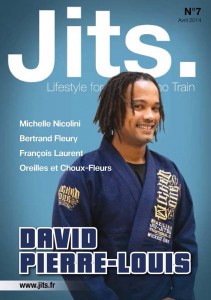 During the summer 2011, I went to Rio with two friends of mine, Ivo and Francky. We rented an apartment on Rua Marques de Abrantes, about 50 meters from Upper, Nova Uniao’s headquarter, where we trained for a month. There I met Dave Menceles and Matt Soroka, heads of Jits Canada. They were trying to find a way to import the magazine to Brazil and I offered to take care of the magazine in France. They were a little wary at first but were willing to see what I could do.
During the summer 2011, I went to Rio with two friends of mine, Ivo and Francky. We rented an apartment on Rua Marques de Abrantes, about 50 meters from Upper, Nova Uniao’s headquarter, where we trained for a month. There I met Dave Menceles and Matt Soroka, heads of Jits Canada. They were trying to find a way to import the magazine to Brazil and I offered to take care of the magazine in France. They were a little wary at first but were willing to see what I could do.
At first, I had in mind to translate the magazine to French (I used to do a lot of translation work back then), but I realized that it’s not what needed to be done.
In France, besidesthe people who have been training for a very long time, no one knows each other. You can go to an academy, and ask if they know who the most graded black belt in France is, and very few will know. Ask them who has been creating schools in Paris for 10 years, who’s traveling to compete and represent the country in international competitions, you’ll get the same answer.
We decided to work to improve the communication around BJJ in France, put some light on the people who are working to make the sport grow, and bring together a community that is way too scattered. We are focusing on the national (and French speaking) BJJ scene. People want to hear about the instructors and professors that they can meet if they were to train in another city, they read enough about the big BJJ stars everywhere online anyway. We bring something unique, different, that we think will help develop the sport in France.
We are a team of three, working with collaborators around the country to bring a quarterly printed magazine and will be releasing issue number 8 next July.
4. You also have another passion: Magic: The Gathering. Can you tell us more about this and are there any similarities between Magic and Jiu-Jitsu?
I’ve been playing Magic: the Gathering for 20 years, and competed at a very high level for 18. I won multiple world titles, including the World Championships with the French team last August and am part of the Magic Pro Tour Hall of Fame. Magic is a strategy game, something between chess and poker. I could definitely compare BJJ to Magic in the strategic approach to the game. In Magic, you have your cards, your own strategies, and think your moves ahead while taking advantage of your opponent’s mistakes.
At school, when other kids were playing soccer, I was inside playing chess. So when I started doing sports again in my mid-twenties, I had a lot to catch upon. My body isn’t exactly naturally prepared to acquire new techniques and moves, so when I drill and train BJJ, I tend to think a lot more strategically than someone who would understand techniques by just watching and drilling them. I pick whatever I think I will be able to do, would fit my game, and would work.
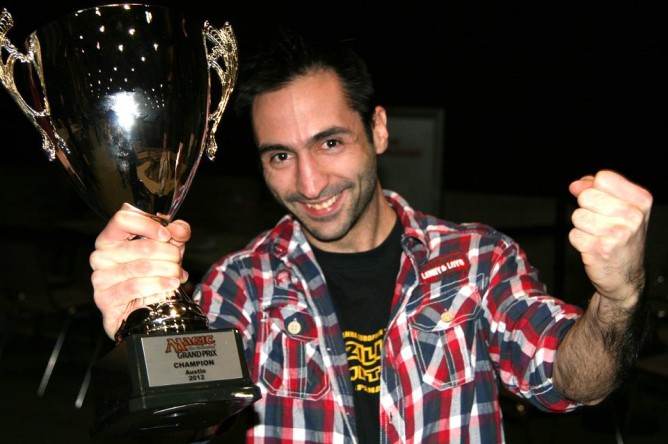
World Magic champion
5. You travel and train all over the world. What are some training experiences that have stood out?
I travel all year to compete in Magic tournaments, and I hate not being able to train when I’m not home. So I decided to take my Gi and train anywhere I go, to stay in shape, try my game against new people, learn from new teachers and meet the BJJ people around the world. Sometimes I get to train with Magic players who happen to be training and who can’t wait to kick my ass (well, they try to at least!).
I’ve trained in Spain, the US, Hawaii, Ireland, Israel, Poland, Czech Republic, Sweden, South Africa, Canada and of course Brazil. I’ve seen all kind of trainings, from a military warm up to just a few stretches before starting, from drilling the same technique for 20 minutes to just 3 repeats of the same move before sparring. It doesn’t really have to do with the country you train in, but more with the teacher there. Every experience is good to take when it comes to BJJ, and I believe I learn more easily when I train abroad. Ask me which technique I saw last month at home, I probably won’t remember. Ask me what I saw two years ago in South Africa, I’ll tell you exactly what it was. I seem to associate the lessons I had to a specific place and remember it no matter how long it was ago, even if I don’t drill the techniques I see here and there all the time.
I went to San Diego last year and wanted to get some training while preparing for a big Magic tournament. It’s usually a week of mentally exhausting preparation, and training is a way to “breathe” and put everything back into focus. So I looked for the academy closest to the hotel we were staying at. There are a ton of gyms in San Diego but it turned out that we were only a 5 minute-walk away from the “University of Jiu-Jitsu”! So I brought my Gi and notepad and went to train and talk with one of the greatest in the world, Saulo Ribeiro. Check out my training report: Here
6. What are your views on the French BJJ scene? How does it compare with the rest of Europe?
French BJJ is growing, but it’s lacking proper infrastructures. It needs to bring new practitioners, be recognized and supported by the state. A few organizations are taking care of the sport but are shooting each other in the foot. It’s far behind Judo and pretty much all mainstream combat sports/martial arts, but by seeing the enthusiasm of the people around it and the addictive nature of the sport, there’s no doubt in my mind it will get there eventually. I guess it’s probably similar to other countries in Europe, the sport is still very new and there still is a lot to be done, everywhere in the world.
7.IBJJF will host the Paris Open in June. How big do you think it will be and what impact will it have on French BJJ? Will we see many French black belts in action (There are like 180 black belts in France)?
French competitors are willing to travel far to fight in IBJJF opens, so it’s no surprise that people here seem excited about the IBJJF open in Paris.Hopefully it will bring some light to our sport.
There are a lot of black belts in France. I don’t have the exact stats, but I believe a lot/most of them are 30+ years old. They either compete at Senior/Masters, or not too much anymore. So hopefully we’ll see both generations compete there, the younger and fitter black belts that France has to offer, and the “more experienced” ones.
8. What is next for you and Jits.fr in 2014? 7. If you want to thank somebody or sponsors, feel free. Thanks Raphael and all the best!
We will keep working on the magazine to offer an even better product, and help the BJJ community to get together and strive!
I’d like to thank everyone who is helping us make this project possible, our readers, our sponsors and everyone who has contributed in some way.

